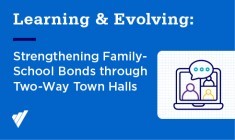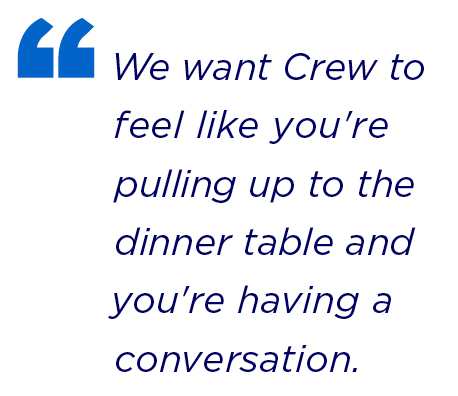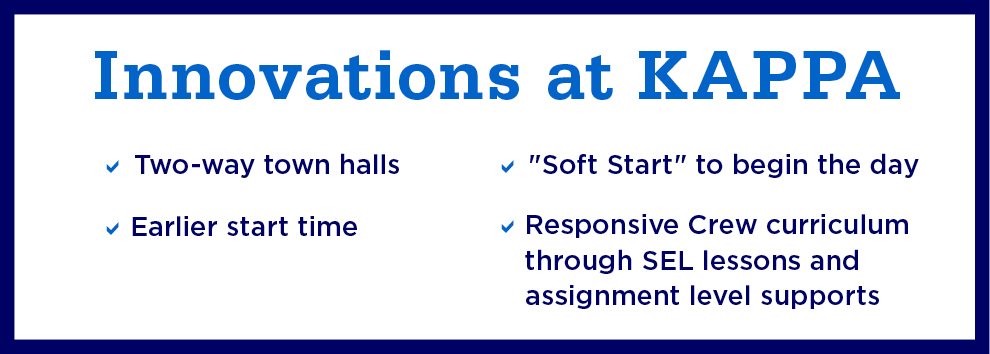Strengthening Family-School Bonds through Two-Way Town Halls

It can be challenging for schools to consistently keep families abreast of new information, and make room for them to ask questions and share concerns. The Knowledge and Power Preparatory Academy (KAPPA) faced this challenge. The pressures of remote instruction prompted them to repurpose their town hall – which they had previously used for ceremonies and special events – to increase parent-school communication. This adaptation helped sustain learning for its 375 students through remote instruction, and facilitated their transition back to in-person learning for the 2021-2022 school year. KAPPA has not only maintained changes to town hall, but has continued expanding opportunities for families and the school to communicate, recognizing this bond as beneficial for students in years to come.
When KAPPA went remote in March 2020, what were once mostly award ceremonies or celebrations that occurred in-person became bimonthly virtual informational presentations run by administrators open to students and their families. Interestingly, because these town halls were virtual, more parents were able to attend, including those whose students were regularly absent. Through these town halls, they were able to gather crucial information – like how to log into Zoom, when and how to access assignments in Google Classroom, updates about classes and virtual events – to support their children at home. But most critically, following announcements and updates, families and students had the chance to voice their concerns, pose questions, and offer suggestions to improve learning conditions for students at KAPPA. In other words, the adaptation from purely ceremonial town halls to informational town halls resulted in a change from from “one-way" town halls which were dominated by educator voices, to "two-way" town halls where parents and students could voice concerns and raise questions. These two-way town halls led to important conversations about students’ academic needs and their social-emotional wellbeing, which, as Principal Casey Fierman describes, helped educators more intentionally care for students during remote learning, and facilitate their transition back to in-person learning in the 2021-2022 school year. Specifically, these conversations inspired KAPPA to make changes to their schedule and to the timing and content of their advisory periods. Recognizing the value of two-way town halls, KAPPA has maintained them into in-person learning.

Fierman shared that in August of 2021, during a town hall, parents and students expressed anxiety about entering the building as news of variants seemed to threaten a safe return. Although KAPPA’s student body is relatively small, they share the building with five other schools, and their classes are spread across two floors. This means that at roughly the same time each day, students from six schools are using the same entrance and moving through hallways in search of classes. In addition, entry to the building requires that anyone who enters the building, including students, pass through a metal detector and security, which takes time and requires students to wait close together in lines. Hearing heavy anxiety around the consequences of what would inevitably be a crowded queue, KAPPA decided to move their start time up earlier, giving students time to practice social distancing and move through the metal detector to their classes safely. Principal Fierman said these adjustments were important in helping students and families feel comfortable returning to campus.

As townhalls continued virtually, Fierman and other educators learned that students were experiencing heightened anxiety during their first period classes. Through town halls, they discovered that students needed time to adjust into their learning environment after going through security and a metal detector, which for many was agitating and made demands for immediate focus difficult to meet. In response, the school made gym and Crew – KAPPA’s long standing advisory – available to students on alternating days, first thing in the morning rather than later in the day so that they could physically and mentally process their morning, talk with teachers and peers, or catch up on work if necessary, in preparation for the day ahead. As a result of what she calls a “soft start” to the day, Fierman shared that students were more prepared to engage with course material, teachers, and one another during in-person learning.

In response to concerns raised during town hall about students’ general anxiety, teachers developed a Crew unit around taking care of oneself, another around building one’s social emotional learning capacity, and another around digital and social media awareness, with each teacher adjusting lessons to fit the needs of their students. Crew is led by 10 teachers across grades 9 through 12 who are not already part of the International Baccalaureate team or the special education team. Each teacher meets the same group of 15 or fewer students in their grade level three times per week for 45 minutes, across all four years of high school. Crew teachers meet each Friday while students attend enrichment opportunities in order to discuss their students’ needs, and from there, develop a lesson that, as Fierman said, “is most pertinent to the kids lives, as informed by the kids, and the parent meetings.” Lessons follow a general template – an opener, low stakes activity, some sort of reflection, and closing with a next steps plan. And while it has been critical for Crew teachers to take proper COVID safety measures, they have returned to holding Crew in circles.
Additionally, Crew provides space and time for students to progress monitor and set academic goals for themselves. According to New Visions coach Jon Green, since March 2020, KAPPA has automated letters sent to students’ homes that identify missing or low-scoring assignments bringing down students’ GPAs. Crew then hosts student-led activities that invite students to examine their course averages, pinpoint the weighted assignments that are resulting in low grades, and then create plans to address them. In this way, Crew’s curriculum is responsive to both students’ social-emotional and academic needs, drawing from Town Halls and other systems and structures to shape lessons.

To provide consistent support for Crew and ensure it is responsive, Fierman created another position – Dean of Culture – which has opened more lines of communication with parents and students in order to make the most of Crew time. Additionally, Fierman has brought in a parent coordinator who regularly sends email updates to parents, a newsletter throughout the school, and provides virtual workshops to help families support students through their academics at home.
Alongside these new changes, KAPPA continues holding town halls twice per month, supporting an open-channel approach to parent-school relationships that continues to support positive relationships and greater student engagement.





